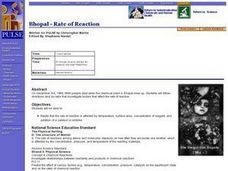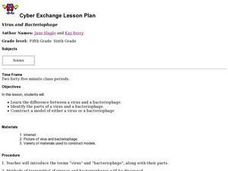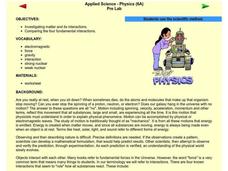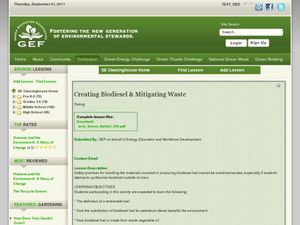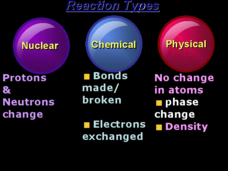Curated OER
Bhopal - Rate of Reaction
Students determine that the rate of reaction is affected by temperature, surface area, concentration of reagent, and addition of a catalyst or inhibitor. They observe that on December 3rd, 1984, 8000 people died when the chemical plant...
Texas State Energy Conservation Office
Investigation: Chemical Models
Science teams make models of four different hydrocarbon compounds that we commonly use for fuel. Then they demonstrate chemical reactions that result when energy is produced. This can be used as an enrichment when your class is studying...
Curated OER
When Things Start Heating Up
Young scholars explore how and why heat is produced from things that give off light, from machines, or when one thing is rubbed against another. They participate in several hands-on activities designed to help them realize that heat is...
Curated OER
Foucault's Pendulum
Students investigate how the motion of the Foucault pendulum proves that the Earth is rotating. They research the Internet about pendulums and conduct an experiment online. They view a multimedia presentation about pendulums and read...
Curated OER
Virus and Bacteriophage
Students examine the differences between a virus and a bacteriophage. They explore various websites, identify the parts of a virus and a bacteriophage, and construct a model of a virus or bacteriophage.
Curated OER
The Energy Debate - Energy of Peanut
Learners articulate the difference between the terms heat and temperature. They calculate the amount of energy associated with a given temperature rise and design an experiment to measure the energy of a fuel.
Curated OER
Physical and Chemical Properties of Matter
Students identify the physical and chemical properties of matter. They review the types of matter. Students list the four states of matter (Solid, Liquid, Gas and Plasma). They recognize and describe the different types of matter.
Curated OER
Hot Cans and Cold Cans
Learners investigate the physics of heating and cooling through conduction, convection, and radiation. Working in groups, they determine the best way to cool a can of water and warm a can of water. Temperature is taken at five minute...
Curated OER
Weight, Friction, and Equilibrium
In this weight worksheet, students read about weight, friction, and equilibrium. Students then complete 10 matching, 7 fill in the blank, and 8 word problems.
Curated OER
What is Matter?
In this matter worksheet, students answer 6 questions about matter. Students distinguish between homogeneous and heterogeneous mixtures, they identify elements and compounds and they distinguish between pure substances and mixtures.
Curated OER
Newton's Second Law
For this Newton's Second Law worksheet, learners answer 13 questions about force, mass and acceleration. They calculate weight, force, masses and acceleration of objects.
Curated OER
Stiochiometry: Quantifying Changes in the Environment
Students examine stoichiometry. In this chemical reaction and mole lesson plan, students complete an experiment based on readiness levels to explore that changes are quantified in chemical reactions.
Curated OER
Matter and Energy
Students explore energy by completing a science worksheet in class. In this principles of matter lesson, students define the vocabulary terms force, gravity, nuclear, and electromagnetic before reading assigned text about energy....
Curated OER
Chemical Equations and Reactions
Graphic organizers, photos, diagrams, and text bring the world of chemical reactions to life. By viewing this presentation, young chemists learn how to recognize when a chemical reaction has occurred, and how to balance chemical...
Curated OER
When Things Start Heating Up
Students develop a clearer understanding of how and why heat is produced from things that give off light, from machines, or when one thing is rubbed against another.
Curated OER
Creating Biodiesel and Mitigating Waste
Biotechnology pros produce their own biofuel using waste oil and fresh vegetable oil. They test the quality of their product using titration techniques and pH analysis. They write their observations and report their findings. Be aware...
Curated OER
The Mathematics of Chemical Formulas
Wow! This is one of the most exhaustive presentations on finding chemical formulas that you will come across! Beginning with the basics, and leaving junior chemists with procedures and concrete examples, this PowerPoint certainly...
Texas State Energy Conservation Office
Fueling the Future
Future mechanical engineers and automotive technicians read about various solutions to using gasoline in cars. Included are electric, fuel-cell-powered, and hybrid vehicles.
Curated OER
Chemistry Slide Collection
A huge slide show provides a review of almost every topic there is to cover in basic chemistry! Your young scientists will be interested to see each illustration and example given. The appearance of the 120 slides varies greatly, most...
Virginia Department of Education
A Crystal Lab
Young chemists grow ionic crystals, metallic crystals, and supersaturated crystals in three different lab experiments. Observing these under a microscope allows pupils to compare the various structures.
Curated OER
Unit 3 Bonding
An organized table charting the different types of chemical bonds arrays this resource. The octet rule, ionization energy, and the naming of compounds are also reviewed. Young chemists answer review questions in multiple choice fashion....
Curated OER
Ranking Molecular Properties Based Upon Intermolecular Forces
A splendid chart of information about chemical bonding tops the first page. In it you will find information on London forces, permanent dipoles, hydrogen bonds, ionic bonds, and covalent bonds. A four-step process for assigning...
National Institute of Open Schooling
Chemical Bonding
Name is Bond, covalent bond. Through readings and answering questions, classes explore the different types of chemical bonds, their characteristics, valence shell electron pair repulsion theory, and atomic orbitals.
Biology Junction
Biochemistry of Cells
Chemistry and biology work hand in hand, without one you literally wouldn't have the other. Using a presentation, individuals learn about plant cells, animal cells, cell responses, macromolecules, DNA bases, and so much more. A worksheet...
Other popular searches
- Gumdrop Atoms and Molecules
- Counting Atoms Molecules
- Making Atoms and Molecules
- Atoms & Molecules Ppt
- Matter Atoms Molecules
- Science, Atoms and Molecules
- Science Atoms and Molecules
- Atoms Molecules Elements
- Atoms & Molecules Pot
- Atoms and Molecules Lesson
- Atoms Molecules Units
- Atoms and Molecules Musical


